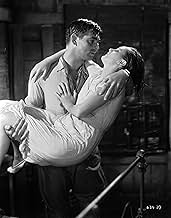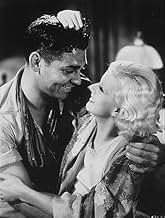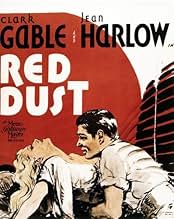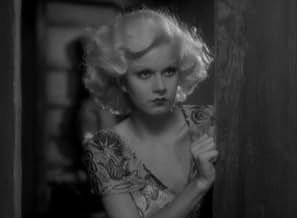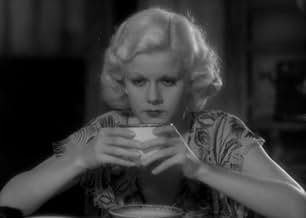CALIFICACIÓN DE IMDb
7.2/10
5.2 k
TU CALIFICACIÓN
El dueño de una plantación de caucho se involucra con la nueva esposa de uno de sus empleados.El dueño de una plantación de caucho se involucra con la nueva esposa de uno de sus empleados.El dueño de una plantación de caucho se involucra con la nueva esposa de uno de sus empleados.
- Dirección
- Guionistas
- Elenco
- Premios
- 4 premios ganados en total
- Dirección
- Guionistas
- Todo el elenco y el equipo
- Producción, taquilla y más en IMDbPro
Opiniones destacadas
Excellent drama set on a rubber plantation stars Clark Gable as a rough-and- tough boss who drives his men to produce rubber in a harsh southeast Asian locale (they mention Saigon a lot). He's awaiting a new surveyor to join his small band on white men (Tully Marshall, Donald Crisp) and Asian workers. But the boat brings Jean Harlow instead, a call girl who has fled the city for a while. Gable and Harlow are terrific as they spit and snarl at each other befall falling into each others' arms. But then the new kid arrives (Gene Raymond) with a wife! Mary Astor (the wife) has one of her first great roles in talkies in this film. Her arrival sets off all kinds of sparks with Gable and with Harlow. The husband is sick right off, allowing Gable and Astor to get friendly. Great chemistry among the stars here, and a very adult script for 1932. Two memorable scenes: Harlow taking a bath in the water barrel; Gable carrying Astor through the torrential monsoon rains. Certainly ranks among the best performances of the 3 stars. Raymond has the thankless role of the wimp husband; Crisp is the drunk; Marshall is the loyal sidekick. Willie Fung (Hoy) and Forrester Harvey (Limey) round out the cast. Hard to believe Harlow is only 21 here and had already made more than 25 films, dating back to silent films in 1928. Oddly, Harlow, Astor, Gable, Marhsall, and Crisp had all started in silent films. It's wonderful to see these stars at their peak. Not to be missed.
The fetid RED DUST of a Malaysian rubber plantation is the setting for an adulterous triangle involving the quick-tempered, rawboned manager, a brassy American prostitute & the upper-class wife of a new employee. Together, they're about to heat up the tropics.
Although blessed with good acting & fine production values, this is merely a soap opera set in the jungle. MGM was pushing the moral envelope here, seeing just how far they could go with libidinous behavior - and in those pre-Production Code days that was pretty far. Clark Gable & Jean Harlow exude sexuality, openly lusting for each other & spreading hormones around the screen. Harlow's lines (of dialogue) are both witty & suggestive, while Gable talks with his eyes and his hands. They were a perfect cinematic match and this film was such a big success that they would repeat the same basic plot 3 years later in CHINA SEAS, although the Code would cause that film to be a bit more covert.
Mary Astor adds a wrinkle to the plot as another fine-looking female for Gable to mate with, but the audience is never in any doubt that gorgeous Harlow will get him in the end. The rest of the cast (Gene Raymond, Donald Crisp, Tully Marshall & giggling Willie Fung) are good in small roles.
It should be noted that the story line contains racist elements, not unusual in a Hollywood film of that era.
By the way, the bedtime story Harlow is reading Gable at the end of the movie is a parody - and a good one - of the animal stories by Thornton W. Burgess which were very popular at the time.
Although blessed with good acting & fine production values, this is merely a soap opera set in the jungle. MGM was pushing the moral envelope here, seeing just how far they could go with libidinous behavior - and in those pre-Production Code days that was pretty far. Clark Gable & Jean Harlow exude sexuality, openly lusting for each other & spreading hormones around the screen. Harlow's lines (of dialogue) are both witty & suggestive, while Gable talks with his eyes and his hands. They were a perfect cinematic match and this film was such a big success that they would repeat the same basic plot 3 years later in CHINA SEAS, although the Code would cause that film to be a bit more covert.
Mary Astor adds a wrinkle to the plot as another fine-looking female for Gable to mate with, but the audience is never in any doubt that gorgeous Harlow will get him in the end. The rest of the cast (Gene Raymond, Donald Crisp, Tully Marshall & giggling Willie Fung) are good in small roles.
It should be noted that the story line contains racist elements, not unusual in a Hollywood film of that era.
By the way, the bedtime story Harlow is reading Gable at the end of the movie is a parody - and a good one - of the animal stories by Thornton W. Burgess which were very popular at the time.
This actually is as good as the publicity says. Definitely one to watch.
Back in the thirties, MGM might be thought of as slightly smug and arrogant but watching this you can understand why they were a bit self satisfied. They were the studio who really knew how to make a movie.
Care, detail and time were clearly invested to evoke the feel the insect laden, steamy Indonesian rain forest where the normal constraints and rules of society don't apply. In a similar sort of way to how Coppola evoked the surreal, dislocated world of Colonel Kurtz in Apocalypse Now, Victor Fleming brings Clarke Gable's private fiefdom vibrantly to life.
What makes this film so watchable ninety years after it wowed the audiences back in 1932 are the two stars. Gable is perfect as the world's most macho man; you can almost smell the gallons of testosterone he sweats out. I've never been a fan of Jean Harlow but for once, she really shows what she can do - she is brilliant in this. You've also got to impressed by her professionalism in the way she effortlessly makes the personality of her character so real considering her husband was either murdered or committed suicide during its filming.
Back in the thirties, MGM might be thought of as slightly smug and arrogant but watching this you can understand why they were a bit self satisfied. They were the studio who really knew how to make a movie.
Care, detail and time were clearly invested to evoke the feel the insect laden, steamy Indonesian rain forest where the normal constraints and rules of society don't apply. In a similar sort of way to how Coppola evoked the surreal, dislocated world of Colonel Kurtz in Apocalypse Now, Victor Fleming brings Clarke Gable's private fiefdom vibrantly to life.
What makes this film so watchable ninety years after it wowed the audiences back in 1932 are the two stars. Gable is perfect as the world's most macho man; you can almost smell the gallons of testosterone he sweats out. I've never been a fan of Jean Harlow but for once, she really shows what she can do - she is brilliant in this. You've also got to impressed by her professionalism in the way she effortlessly makes the personality of her character so real considering her husband was either murdered or committed suicide during its filming.
Context is an important element in viewing any work of art or commerce and movies are both. "Red Dust" at it's core is about human weakness and strength, in degree and in full force. Mary Astor, a star since appearing opposite John Barrymore in "Don Juan", plays a repressed wife who doesn't believe in the strength of her husband (Gene Raymond) nor her own weakness when it comes to resisting the animal magnetism of rubber plantation owner Dennis (Clark Gable). Conversely, Gable doesn't realize his weakness in letting himself get involved with the ladylike Astor and underestimates the strength of prostitute Vantine (Jean Harlow) who, when Astor shoots Gable, gives witness to Raymond that his wife is innocent and that Gable deserved shooting. For it's time, 1932, "Red Dust" is sexually progressive, showing the freely running passions of Gable and the two women, while in retrospect, it's depiction of Asians is as poor stereotypes. Willie Fung, who plays Gable's houseboy, is also derided as gay in the script by the line delivered by Jean Harlow. Harlow notices Fung giggling at her underwear, to which she replies "Gee...you even find them in the jungle."
"Red Dust" has a tremendous "back story" as well. John Gilbert was to play the part of Dennis originally as an attempt to bolster his masculine image which had been damaged by the higher-than-anticipated timbre of his voice as recorded by early sound equipment. With the sensation caused by Gable when he returned Norma Shearer's slap in the face in "A Free Soul" Gable's star rose mercurily. No "hero" ever countered the indignation of the leading lady before, and certainly not the divas at Metro-Goldwyn-Mayer. Gable was a whole new breed of leading man. Jean Harlow's star had been on the ascendant after scoring a huge hit in "Red Headed Woman" a scandalous story of a secretary who sleeps her way to the top. The realism of these two performers in those films made them a natural for the raw jungle tale of passion and betrayal. In the middle of the making of the film, Jean Harlow's producer-husband, Paul Bern, was found dead. The scandal that followed frightened the studio who thought that Harlow's career was over. Scandal had ruined the careers of Fatty Arbuckle and Clara Bow, causing their studio (Paramount) to loose millions on their films. M.G.M. was surprised when Harlow's fame and popularity increased. For her part, Harlow returned to the studio and never spoke an unkind word about her late husband. Bern, it turned out, had a common law wife who had emerged from years-long institutionalization and confronted him about his new wife.
Racism is not a key element in the plot of "Red Dust". For that, you would have to see "The Mask of Fu Manchu" where the Asians are neither lazy nor stupid, but sexual predators, instead. Or you could watch any number of other World War Two American movies with Asians in them. But for accurate Pre-censorship Hollywood adult dialogue and plot, "Red Dust" will do nicely, thank you.
"Red Dust" has a tremendous "back story" as well. John Gilbert was to play the part of Dennis originally as an attempt to bolster his masculine image which had been damaged by the higher-than-anticipated timbre of his voice as recorded by early sound equipment. With the sensation caused by Gable when he returned Norma Shearer's slap in the face in "A Free Soul" Gable's star rose mercurily. No "hero" ever countered the indignation of the leading lady before, and certainly not the divas at Metro-Goldwyn-Mayer. Gable was a whole new breed of leading man. Jean Harlow's star had been on the ascendant after scoring a huge hit in "Red Headed Woman" a scandalous story of a secretary who sleeps her way to the top. The realism of these two performers in those films made them a natural for the raw jungle tale of passion and betrayal. In the middle of the making of the film, Jean Harlow's producer-husband, Paul Bern, was found dead. The scandal that followed frightened the studio who thought that Harlow's career was over. Scandal had ruined the careers of Fatty Arbuckle and Clara Bow, causing their studio (Paramount) to loose millions on their films. M.G.M. was surprised when Harlow's fame and popularity increased. For her part, Harlow returned to the studio and never spoke an unkind word about her late husband. Bern, it turned out, had a common law wife who had emerged from years-long institutionalization and confronted him about his new wife.
Racism is not a key element in the plot of "Red Dust". For that, you would have to see "The Mask of Fu Manchu" where the Asians are neither lazy nor stupid, but sexual predators, instead. Or you could watch any number of other World War Two American movies with Asians in them. But for accurate Pre-censorship Hollywood adult dialogue and plot, "Red Dust" will do nicely, thank you.
A very entertaining movie with Gable and Harlow at their best.They really shine in their roles.Also a good performance by a young Mary Astor.It's easy to see that Clark Gable consolidated his newly won fame with this film.He shows his magnificent charisma on the screen perhaps for the first time to full effect.Harlow matches him all the way.An inspired pairing.
¿Sabías que…?
- TriviaDuring filming of the famous rain-barrel sequence, Jean Harlow reportedly stood up--topless--and called out something along the lines of "one for the boys in the lab!" Director Victor Fleming allegedly removed the film from the camera to prevent any footage from reaching the black market.
- ErroresWhen Clark Gable and Gene Raymond are in the tree while hunting, after the line: 'This would be a bad country to raise children in, wouldn't it?' Thecloud in the background changes dramatically.
- Citas
Barbara Willis: [watching the workers pouring liquid rubber] Why, it's milk.
Dennis Carson: Oh no, just rubber. But you could drink it if you care to stretch a point.
Barbara Willis: Oh, I once knew a man who made a joke like that. He was run over by a truck.
Dennis Carson: Were you driving it?
Barbara Willis: Yes!
Dennis Carson: Well, you're out of luck here. We only have ox-carts and every ox knows me personally.
- ConexionesEdited into Hollywood: The Dream Factory (1972)
Selecciones populares
Inicia sesión para calificar y agrega a la lista de videos para obtener recomendaciones personalizadas
- How long is Red Dust?Con tecnología de Alexa
Detalles
Taquilla
- Presupuesto
- USD 408,000 (estimado)
- Tiempo de ejecución1 hora 23 minutos
- Color
- Relación de aspecto
- 1.37 : 1
Contribuir a esta página
Sugiere una edición o agrega el contenido que falta

Principales brechas de datos
By what name was Tierra de pasión (1932) officially released in India in English?
Responda
